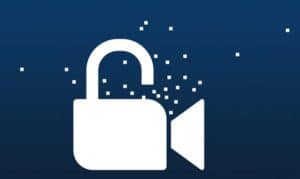While everyone is already feeling uncertain and vulnerable, they turned to online conference services like Zoom, only to have their private information shared and left open to hackers.

They also left the “door” to your camera wide open to hackers who want to exploit that vulnerability.
So let’s take these issues one at a time, starting with Zoom’s admission reported in a Motherboard article:
What the company and its privacy policy don’t make clear is that the iOS version of the Zoom app is sending some analytics data to Facebook, even if Zoom users don’t have a Facebook account.
The key thing to understand is you don’t have a say in the matter if a company like Zoom decides to sell its data to Facebook. Even if you don’t use Facebook, your information can still be sold without your consent.
The Motherboard piece also revealed exactly what data Zoom is sending:
The Zoom app notifies Facebook when the user opens the app, details on the user’s device such as the model, the time zone and city they are connecting from, which phone carrier they are using, and a unique advertiser identifier created by the user’s device which companies can use to target a user with advertisements.
There isn’t anything in Zoom’s privacy policy that mentions this was taking place. Thankfully, Zoom has taken action — but only after being exposed in a class action lawsuit.
Zoom responded in typical corporate fashion:
“To address this, in the next few days, we will be removing the Facebook SDK and reconfiguring the feature so that users will still be able to login with Facebook via their browser. Users will need to update to the latest version of our application once it becomes available in order for these changes to take hold, and we encourage them to do so.”
So the question remains, how would Zoom have continued business operations if they hadn’t been exposed to a lawsuit? Guess we’ll never know the full answer.
If this already suspicious activity on Zoom’s part ended there, it might not look so bad for the company. But it gets worse…
Your Microphone and Camera: Hacked Thanks to Zoom
If you have a Mac, a former NSA hacker found a couple of Zoom vulnerabilities that could make your personal and business life a living hell:
Hot on the heels of two security researchers finding a Zoom bug that can be abused to steal Windows passwords, another security researcher found two new bugs that can be used to take over a Zoom user’s Mac, including tapping into the webcam and microphone.
The worst part is, a portion of this privacy-invading bug can install itself without any action on your part.
The NSA hacker stated quite simply “if you care about your security and privacy, perhaps stop using Zoom.”
Maybe that’s a good idea. A really good idea, in fact. Zoom’s privacy faults continue, because they are also leaking email addresses and photos to strangers. This blatant violation of privacy “only” affects thousands of users though.
The bottom line seems to be that companies like Zoom are finding it harder and harder to keep their user’s data private.
So maybe your only remedy is to make it harder and harder for them to get access to your most sensitive data in the first place.
How to Stay Out of Public Databases
There are public databases that track your exact location, eating habits, spending habits, your income, your online habits, and many other parts of your private life.
With just a few clicks, a phone call, and a few dollars almost everything a Government agency like the IRS wants to find out about you can quickly be put together into a complete file.
That’s why I want to tell you about our popular “Go Off the Grid” report, which is your blueprint for living a truly private life.
You will discover:
- How to get your name out of public databases.
- How to make your physical and digital assets invisible to prying eyes.
- Ensure your vehicle ownership is 100% untraceable.
- How to make your wealth completely anonymous.
- How to protect yourself online.
But that’s not all, inside the report you’ll also find the following gems…
- DO THIS NOW: The one thing almost no one does to properly hide their home address, and it has nothing to do with getting a PO Box. (page 4).
- The “privacy veil” you can set up with a few clicks that renders you practically anonymous — and helps you slash your taxes. (page 24)
- Secure your phone number and your calls from snoops and credit agencies in minutes with this “Smart” blueprint. (page 13)
- The secret “shield” that makes your home, car, and other assets practically lien proof. You’ll be able to “set it once and forget it.” (page 16)
- The digital “Ghost” that can protect you online, make your digital footprints disappear, and even save you money on airplane tickets. (page 19)
- And more… including how to legally remove yourself from the banking system.
If you are serious about protecting your privacy from irresponsible companies, the Government, and other snoops, then you don’t want to miss this valuable report…
==> Click here to get your copy now
To living privately,
Bobby Casey
Location Independent Entrepreneur
P.S. What if you have made sensitive video calls while using Zoom? Your webcam and microphone could be wide open for viewing by the wrong person. And that’s where my new report comes in…
Inside you’ll discover how to go completely “off the grid,” without having to move out to a cabin in Montana. In fact, you won’t even have to leave your couch.

